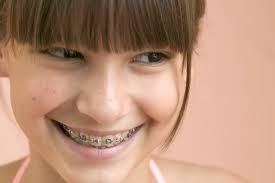 Straightening crooked teeth can have a profoundly positive impact on your oral health, as well as your confidence. Unfortunately, while highly effective, wearing orthodontic braces also affects your daily routines, like eating and brushing your teeth. By making dental hygiene slightly more difficult, braces can increase a patient’s risk of developing dental issues that result from excessive dental plaque, including tooth decay (the disease that causes cavities). Luckily, however, cavities are still highly preventable even with metal brackets and wires attached to your teeth. To help keep our patients’ mouths and braces clean and clear of cavities, Los Angeles orthodontist, Dr. David Alpan, takes the time to educate each patient about proper oral hygiene, and provides special instruments designed to effectively clean around braces.
Straightening crooked teeth can have a profoundly positive impact on your oral health, as well as your confidence. Unfortunately, while highly effective, wearing orthodontic braces also affects your daily routines, like eating and brushing your teeth. By making dental hygiene slightly more difficult, braces can increase a patient’s risk of developing dental issues that result from excessive dental plaque, including tooth decay (the disease that causes cavities). Luckily, however, cavities are still highly preventable even with metal brackets and wires attached to your teeth. To help keep our patients’ mouths and braces clean and clear of cavities, Los Angeles orthodontist, Dr. David Alpan, takes the time to educate each patient about proper oral hygiene, and provides special instruments designed to effectively clean around braces.
The Birth of a Cavity
With or without braces, good dental hygiene focuses on controlling the buildup of dental plaque, which contains over 600 different kinds of oral bacteria. As the microbes accumulate on your teeth, some of them release acid (metabolized from sugar and other carbohydrates) that can destroy tooth enamel, making the tooth vulnerable to infectious bacteria.
Brushing and flossing your teeth every day, along with regular dental checkups and cleanings, is the most effective method of controlling dental plaque, bacteria, and the acid they produce. During orthodontic treatment, sticky plaque and food debris can cling to hard-to-reach places, like between your braces and teeth, and diligent care is required to ensure that your teeth remain clean and healthy.
Good Hygiene with Braces
Besides a toothbrush and floss, Dr. Alpan provides patients with case-specific tools and instructions to maximize hygiene during orthodontic treatment. An interdental cleaner will help you clean away plaque and food debris from behind and around your braces. Also, refraining from certain foods like candy and jerky will help keep maintenance simple. If possible, brush after every meal to minimize the amount of acid that oral bacteria produce. If you can’t brush your teeth after a meal, at least rinse your mouth with water, swishing it around for at least 30 seconds to dislodge food particles and neutralize acid.
About Dr. Alpan:
With offices in Los Angeles and Beverly Hills, Alpan Orthodontics has proudly served patients and their families from all surrounding communities since 1999. To schedule your orthodontic consultation, contact our Los Angeles office at 213-513-7559 to find the location nearest to you.
